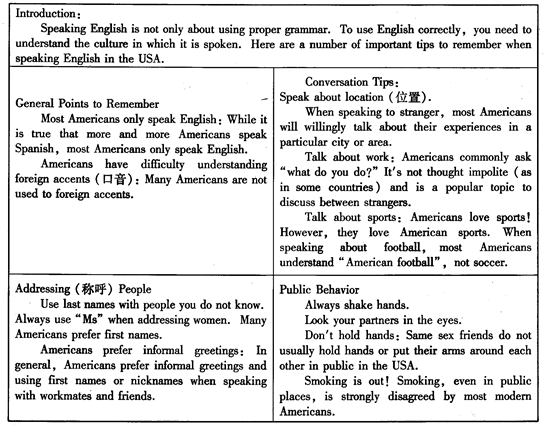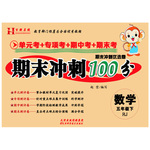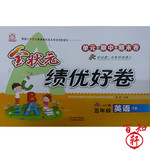题目内容

【小题1】 What is necessary to know when we speak English besides using grammar?
| A.Introduction. | B.The culture. | C.Grammar. | D.Topics. |
| A.speak about location | B.talk about sports |
| C.address people | D.talk about work |
| A.Americans shake hands when greeting same sex friends |
| B.different sex friends should hold hands when first meeting |
| C.when you speak to others, it's polite to look into their eyes |
| D.smoking is not allowed in the modem United Sates |
| A.American English Tips. | B.Language Differences. |
| C.The Different Language Culture. | D.American Customs. |
【小题1】B
【小题2】A
【小题3】C
【小题4】A
解析试题分析:短文大意:本文介绍了说美国英语的一些技巧。说英语不仅仅是正确地使用语法,还要懂得英语文化才行。
【小题1】细节理解题,根据Introduction中前两句话可知我们说英语不仅仅是正确使用语法,还要懂得英语文化,所以选B。
【小题2】细节理解题。“和陌生人说话的时候,可以问问他们从哪里来,然后通过那个地址与其联系”可通常被用作谈论地址的句子,所以选A。
【小题3】细节理解题。根据Public Behavior可知跟他人说话时,看着他的眼睛是有礼貌的举止,所以选C。
【小题4】标题归纳题。通读全文可知是在说美国英语的技巧,所以选A。
考点:教育类阅读。

 百强名校期末冲刺100分系列答案
百强名校期末冲刺100分系列答案 好成绩1加1期末冲刺100分系列答案
好成绩1加1期末冲刺100分系列答案 金状元绩优好卷系列答案
金状元绩优好卷系列答案Last weekend, our family went to have Christmas dinner in a restaurant. We were the only family with a baby in the restaurant. Suddenly, my baby Erik became excited when we were enjoying our meal. I looked around and saw an old man with old clothes and dirty old shoes. His hair was unwashed. He was smiling at my Erik.
“He might hurt my Erik,” I thought. Everyone in the restaurant looked at us and the old man. Then we decided to leave. The old man sat between the door and us.
As I walked closer to the man, I turned my back. Suddenly, Erik leaned(倾斜) over my arms, reaching with both arms in a baby’s pick-me-up position(姿势). Before I could stop him, Erik had escaped(逃跑) from my arms to the man’s. Soon the very old smelly man and my young baby developed a kind of friendship.
Erik put his little hand on the man’s face, and I saw the old man closed his eyes and tears running down his face. His aged hands held my baby so gently(温柔地). A moment later, the old man opened his eyes, passed me my baby and said, “Thank you, Madam. You’ve given me the best Christmas gift.”
I cried, with my face burning hot. A child saw a soul(灵魂), but a mother saw only a kind of clothes.
【小题1】 At first, the writer thought the old man was ______ .
| A.terrible | B.friendly |
| C.impossible | D.wise |
| A.had finished the meal already |
| B.had some important things to do |
| C.thought the food there was bad |
| D.worried about their baby’s safety |
| A.showed kindness to the old man | B.had seen the old man before |
| C.was popular in the restaurant | D.was hurt by the old man |
| A.Because the writer bought food for him |
| B.Because the writer said Merry Christmas to him |
| C.Because staying with the baby made him feel happy |
| D.Because the writer asked him to play with her baby |
| A.A special restaurant | B.A lovely baby |
| C.Soul and clothes | D.Parents’ influence on babies |
You probably know you should say “please” and “thank you” at restaurants. You probably know the rules of a library. You know you should respect and be nice to your classmates. But do you have music manners?
Keep It Down! You have to notice the volume of your music. You should not play your music so loud that everyone around you can hear it. Some people might even get angry. Usually, when you play the music loud on an MP3 player, other people can’t hear the words of the song. They just hear a loud sound. No one wants to listen to this. Very loud music can also be bad for your ears. So even if you are alone when listening to our MP3 players, you shouldn’t turn it up too high.
Take Them Off! You need to know when to turn your MP3 off and put it away. Libraries, and schools don’t allow MP3 players. There are other places, like museums, that don’t have rules, but it would be rude to have your MP3 player on. Sometimes, it doesn’t make sense to listen on your MP3 player at event. Why would you listen to music at a play, a movie or a sporting event? You would miss what is going on and others would wonder why you even came.
Take One Out! Once in a while it’s okay just to take out one earphone(耳机)and not the other. Imagine you are listening on your MP3 player when someone asks you the way. It would not be rude to take out one earphone, tell him the way, and put back the earphone and continue listening. You can also do this when you order food at a fast-food restaurant or when you answer the telephone and it’s not for you.
【小题1】The underlined word “volume” in Paragraph Two probably means “_______”
| A.the type of music | B.the amount of a sound |
| C.the length of a song | D.the colour of an MP3 player |
| A.the theatre won’t allow it | B.the actors will get angry |
| C.others won’t hear the play well | D.we will miss part of the play |
| A.school | B.libraries | C.restaurants | D.museums |
| A.Music lovers | B.Music manners | C.MP3 players | D.MP3 earphones |
"Depend on yourself" is what nature says to every man. Parents can help you. Teachers can help you. Others still can help you. But all these only help you to help yourself.
There have been many great men in history. But many of them were very poor in childhood, and had no uncles, aunts or friends to help them. They couldn't depend on them for education. They saw how it was, and began to work with their efforts.
One of the most famous teachers in England used to tell his pupils, "I can't make worthy men of you, but I can help you make men of yourselves."
Some young men are not the best in anything, and they are to be pitied(值得同情的). They can never do things successfully if they don't see their weak points and change their courses(做法). They are nothing now, and will be nothing as long as they live if they don't follow the advice of their parents and teachers, and depend on their own efforts.
【小题1】"Depend on yourself" in this passage means ________.
| A.depend on your own efforts | B.depend on nature |
| C.wait for others to help | D.depend on your parents |
| A.they were very poor in childhood |
| B.they could not depend on schools for an education |
| C.they made great efforts to learn and work |
| D.they wanted very much to become famous |
| A.make his pupils worthy men |
| B.teach his pupils everything he knows |
| C.help his pupils make themselves useful men |
| D.make his pupils men of strength and courage |
| A.they are to be pitied |
| B.they can never be successful |
| C.they are nothing now and will be nothing in the future |
| D.they can be successful in their work |
| A.we should depend on our parents and teachers |
| B.we can depend on our friends and relatives |
| C.all great men in history were poor when they were young |
| D.we can't depend on our parents or teachers, but we can get advice from them |
We all have our own ways of sharing our life experiences with others.
Photographers use cameras, artists use brushes, musicians use songs and writers use stories.
Spencer Johnson’s story Who Moved My Cheese? shows changes exist in(存在于)our life. Life changes and so we do. We must change ourselves to face the changing environment, or we will fail.
Just look at the cycle(循环)of the seasons. Trees bud(发芽)in spring and in summer their leaves turn green. In autumn, their leaves start to fall onto the ground. When winter comes, there are no leaves on trees. Next spring the cycle begins again. Since we know there are cycles in nature, we can prepare for them. We know it is colder in winter and hotter in summer, so we can dress properly.
Since we accept the cycles of nature, we should also accept the changes in our life.
We can prepare ourselves for changes by becoming more flexible(灵活的). We can regard the changes in our life as chances. As we keep changing ourselves, we can keep up with the changes in our life.【小题1】 Who Moved My Cheese? tells us that ______________.
| A.changes exist in our life |
| B.we should move others’ things |
| C.we should use books to share our life experiences |
| D.there are difficulties in our life |
【小题2】 The cycle of the seasons means _____________.| A.we should wear warm clothes in winter |
| B.we should accept the changes in our life |
| C.we should prepare for the weather |
| D.leaves turn yellow in autumn |
【小题3】 If you fail a test, what should you think according to the passage?| A.I have no chance to pass the test. |
| B.Exams are hard for me. |
| C.I have bad luck. |
| D.It’s good for me because I know there are more to learn. |
【小题4】What’s the main idea of this passage?| A.Weather changes in different seasons. |
| B.Who Moved My Cheese? is a good book. |
| C.We should change ourselves when life changes. |
| D.We should not lose heart when we meet with difficulties. |
【小题5】 English is very important in the modern world. Many people want to learn it well. Here are some things that I want to say about learning it.
To learn English well, you need two things-passion and good learning methods (方法). Passion is the more important one. Why? Because passion makes you want to learn English. Learning methods only tell you how to learn it better and faster.
If you love learning English, you will learn it regularly (有规律地) and spend much time on it. It will also be easy for you to remember new words and grammar rules. ________ For example, some people like history and know a lot about World War II. If you ask a person who doesn’t like history to memorize all the facts, he probably can’t do it.
When you don’t want to learn English, you can do the following things.
First, imagine that you can talk to native speakers just as you talk in your mother language. Imagine yourself to be a manager in a foreign company. Imagine you’re living in an English-speaking country.
Second, use English as much as possible. This is very important. The more you use English, the better you’ll learn it. English is very popular, so you can use it everywhere. You can watch American cartoons, write English diaries, and read interesting books written in English.
【小题1】The underlined word “passion” means “______” in Chinese.
| A.态度 | B.热情 | C.步骤 | D.情绪 |
| A.You can’t memorize everything while learning English. |
| B.You will find it hard to learn English. |
| C.That’s because you can easily remember what you like. |
| D.Everyone likes to learn what they like most. |
| A.Go to English-speaking countries. |
| B.Read interesting English books. |
| C.Stop learning it for some time. |
| D.Listen to music or play sports. |
| A.You need two things if you want to learn English well. |
| B.It’s difficult for a person to know a lot about World War II if he isn’t interested in history. |
| C.Learning methods are more important than passion. |
| D.It’s easy for you to remember new words or grammar rules if you’re an English lover. |
| A.the importance of learning English |
| B.English in the modern world |
| C.how to write e-mails to other people |
| D.some advice on how to learn English |
The junior high school graduates have to take a P.E. test in many places around China. The full marks are usually 30 points and it means much in the senior high school entrance exam.
In Nanjing, the test is held in April. Students have the test in their own schools. Each student is tested on three sports. They can choose long jump, basketball dribbling (运球) or volleyball. The pull-up is for boys and girls can choose the sit-up. Both boys and girls must skip in the test.
Most students find the test easy and more than 90%of them can get full marks. That’s because they have been training for it during the three whole years. Students in Junior Three usually do lots of practice in P.E. classes. The training makes the test easier than it seems to be.
Students in Nanjing don’t need to run a lot for the test, but students in Beijing must do lots of running for the test. Running is one of the sports in test. So in P.E. classes, they usually run a lot. Sometimes they have to run 3,000 meters in one class. Most teachers and parents welcome the P.E. test. They say it helps students build up their health.
【小题1】The P.E. test in Nanjing includes all of these sports except __________.
| A.skipping | B.basketball | C.football | D.volleyball |
| A.spring | B.Junior One | C.autumn | D.Junior Two |
| A.仰卧起坐 | B.引体向上 | C.俯卧撑 | D.跳高 |
| A.All the students must be tested on skipping in Nanjing. |
| B.Few students in Nanjingcan get full marks in the P.E. test. |
| C.Students in Beijing needn’t run during the test. |
| D.Students in Nanjing should take part in four sports in the P.E. test. |
| A.It is difficult. | B.It is easy. | C.It is bad. | D.It is good. |
Students these days often have a lot of worries. Sometimes they have problems with their schoolwork, and sometimes with their friends. Some people think the worst thing is to do nothing. Laura Mills, a teenager from Washington, agrees. “Problems and worries are normal in life,” says Laura. “But I think talking to someone helps a lot. If we don’t talk to someone, we’ll certainly feel worse.”
Laura once lost her purse, and worried for days. She was afraid to tell her parents about it. She even walked three miles to school each day because she didn’t have any money. She just kept thinking. “If I tell my parents, they’ll be angry!” But in the end, she talked to her parents and they were really understanding. Her dad said he sometimes made careless mistakes himself. They got her a new purse and asked her to be more careful. “I will always remember to share my problems in the future!” Laura says.
Robert Hunt advises students about common problems. He feels the same way as Laura. “It is best not to avoid our problems. We should always try to solve (解决) them.” He thinks that you can first find someone to talk to. This person doesn’t need to be an expert (专家) like himself. Students often forget that their parents have more experience than them, and are always there to help them.
In English, we say that sharing a problem is like cutting it in half. So you’re halfway to solving a problem if you talk to someone about it!
【小题1】Which of the following can be put in the blank in Paragraph One?
| A.What can they do about this? |
| B.Where do the problems come from? |
| C.When did they have these problems? |
| D.Why do they have so many problems? |
| A.answer a question | B.give an example |
| C.introduce his friend | D.share his experience |
| A.Laura’s teacher |
| B.the writer of the passage |
| C.a person with a problem |
| D.an expert on students’ problem |
| A.Few children are careful with their money. |
| B.Parents are more experienced than children |
| C.Talking to someone helps to solve problems. |
| D.Students often have a lot of worries at school |